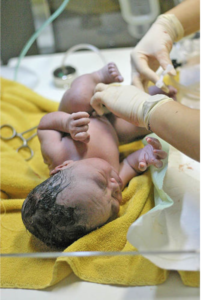You might have thought that I’m against people having children and therefore be surprised that I am writing about having children. I am definitely in favor of people having babies; my goal is for all babies to be planned, loved and healthy—and not too many!
I believe family planning should include the treatment of infertility. It was always a joy for me when a couple who had dealt with fertility issues was able to conceive. Often I was able to attend the birth of that child—a double joy!
What a child needs most is two loving parents. It appears that marriage before childbearing is no longer in style—40% of women giving birth in the USA are unmarried. However, a marriage certificate is not nearly as important as parents being in a stable relationship. Planned pregnancies are most likely to produce healthy, loved children. This column is an update on steps people can take to have a healthy child.
If the couple has been using hormonal contraception, it may be wise for them to stop and use a barrier method for a couple of months before trying to conceive. The chances of having twins may be increased if conception occurs right after stopping “the pillâ€.
There are several actions that people can take to improve fertility without seeing a doctor. Being overweight is a cause of female infertility, so losing weight may help. Eating well helps improve fertility for both men and women. The suggested diet includes healthy protein, whole grains, fruits and vegetables—the same as for all of us. “Fast food†seems to prolong infertility! For men, underwear can make a difference; the “family jewels†make more sperm if they hang loose.
Grain products in the USA are now enriched with traces of folate (a B vitamin). Fewer kids are born with neural tube defects (like spina bifida) and other problems, thanks to this vitamin. It is recommended that women start taking prenatal vitamins (which contain folate) at least 1 month before trying to conceive. It is even suggested that all women of reproductive age take folate supplementation, even if they use contraception, because failures happen. Furthermore, folate may increase a woman’s fertility.
Women usually take better care of themselves when they are pregnant, knowing that a healthy mom is more likely to have a healthy baby. For instance, women often want to know how much weight they should gain. I respond that the quality of the food is as important as the pounds gained.Â
In medical school I was taught that alcohol is ok for women to drink in pregnancy. More recently we have been recommending that women avoid any alcohol when pregnant—but that recommendation has changed again. It is now thought that a very small amount of alcohol is possibly safe—but total avoidance is safest.
The literature is clear on tobacco products: they are harmful in pregnancy and should be avoided completely. Marijuana use in pregnancy has not been studied very much because of its legal status. One advantage of its legalization in Colorado is that it will be possible to get better information about its safety. I hope that medical scientists are following children whose mothers used “weed†when pregnant, but we won’t know about bad effects, if any, for many years.
Here is the latest information about some other “dos and don’ts†in pregnancy. Things that seem safe include: artificial sweeteners, caffeine in low to moderate amounts, insect repellants (including DEET), hair dyes, air travel and sexual intercourse (unless advised otherwise). Dental care, including x-rays and local anesthesia, is safe and encouraged during pregnancy—but laughing gas should be avoided, especially early in pregnancy. Exercise is encouraged, although women should take extra care to avoid injury when pregnant.
It is best to avoid getting overheated in the first trimester (up to 12 weeks), so hot tubs and long, hot showers are out. Swimming is safe, but waterskiing is not. Fish are good nutrition, but fish with high levels of mercury are especially dangerous in pregnancy. The fetal nervous system is particularly vulnerable to this toxic metal. Pregnant women should pay attention to local advisories concerning fish in lakes and streams, and avoid the most toxic ocean species: swordfish, tilefish, shark and mackerel king. Some kinds of tuna are contaminated with more mercury than others.
In a world that is overpopulated our goal should be for every child to get a good start in life by being healthy and loved.
© Richard Grossman MD 2018
